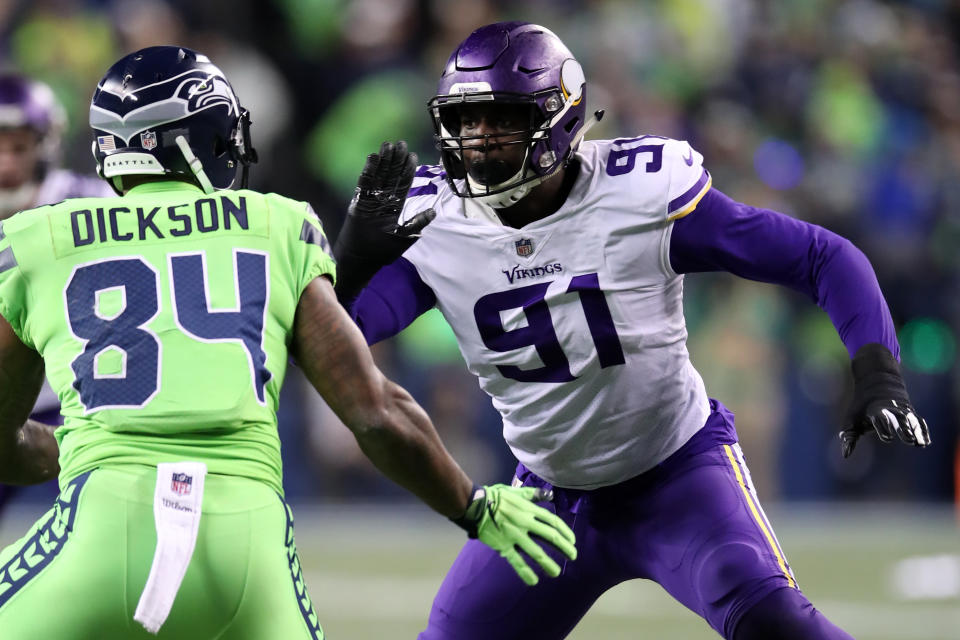NFL's 'Inspire Change' initiative will bring new digital African-American history courses to schools

The NFL launched its new “Inspire Change” initiative, something it hopes will help create positive social changes in communities across the country, the league announced on Friday.
The seven-year social justice partnership — which kicks off with a new commercial airing this weekend that will run through the Super Bowl — has three main focus areas it will tackle with the Players Coalition: Education and economic advancement, police and community relations and criminal justice reform.
“Now, with a season behind us, look at where we are going into 2019,” Troy Vincent, the NFL’s executive vice president of football operations, told ESPN. “I’m talking about a true partnership. I’m talking about policy change. I’m talking about using the platform for the greater good. So that part is not only refreshing, it’s like, ‘Look at what we can do when we actually work together.'”
According to ESPN, the league committed $8.5 million to the partnership in 2018, and the NFL Foundation added $2 million in grants for clubs and both retired and active players. The total commitment from the league is expected to hit $12 million for 2019.
Throughout the length of the deal, though, the total commitment could exceed $89 million — as the initial figures didn’t include money raised by teams or players, per the report.
“We’ve come a long way, but we have room to keep growing. That’s an important piece for us to constantly look at,” Anna Isaacson, the NFL’s vice president of social responsibility, told ESPN. “We have been in this for the last couple of years. We’ve done the listening. We’ve met with dozens of organizations. We’ve heard from people. We’ve heard from our players.
“And now we’re in a place where we can put a stake in the ground and actually make an impact. But we [the NFL and players] have a lot of work to do, and there’s a lot of work to do in our communities. This is a long-term commitment.”

Bringing new digital African-American history program to schools
One major part of the NFL’s new initiative starts with it helping to create a new digital African-American history education program in 175 schools across the country. The schools — in Arkansas, Florida, Georgia, Montana and North Carolina — were designated as high-need and high-poverty areas where previous similar history programs had been cut.
Minnesota Vikings defensive end Stephen Weatherly said this is a huge step, as nearly 95 percent of his knowledge of African-American history was learned at home, not in the classroom. All he remembered learning about in school, he told Sports Illustrated, was about key figures like Martin Luther King, Jr., Malcom X, George Washington Carver and others during Black History Month.
“It made it seem like, wow, my whole people’s successes came from these 20-30 people, out of all of history,” Weatherly told Sports Illustrated. “That’s kind of the perception you get, if you don’t have it coming from another source.”
The course, developed through EverFi, will come at no charge to students or schools, and is something that the Vikings have been working to implement at local high schools in the Minneapolis-area over the past three years, according to Sports Illustrated.
They have customized it, too, adding in video stories from various Vikings legends — including Hall of Famer Carl Eller, who told a story about when he was denied service at a cafe counter as a child while trying to buy a hamburger because of the color of his skin.
Part of the larger initiative also approved two major grants issued to the Big Brothers Big Sisters of America and Operation HOPE, an organization that helps young people and adults with the financial tools and education they need, according to the release. The league will also take part in multiple events related to social justice during Super Bowl week in Atlanta next month.
As more and more of these programs have been rolled out — both by the NFL and by teams on a local level — Weatherly said he’s noticed a real change in the conversation.
“I have noticed more people whom social justice issues wouldn’t directly impact, talking about it more,” Weatherly told Sports Illustrated. “No longer is it then a ‘them’ problem, or a ‘these people’ problem, it’s an ‘everyone’ problem. Now that the NFL has brought a lot of awareness to the problem, even if it was by accident, they are saying, here’s what we are going to do to be a part of the solution, and no longer be a bystander. I hope with that extra oomph from the NFL and NFL teams, we can start to see real changes in communities.”
Though there’s still a long way to go, Vincent said the NFL has made significant progress in an area it should have long ago.
“We’re not a social justice group, and we will never be that,” Vincent told ESPN. “We’re just playing a part in the general conversation. Are we doing our part? We’ve made progress. But we’re not there yet.”
Subscribe to The Yahoo Sports NFL Podcast
Apple Podcasts• Stitcher • Google Podcasts
More from Yahoo Sports:
• MLB desperately needs to fix its free agency problem
• Sports anchor calls Cardinals hiring ‘covert racism’
• Survey reveals what NFL players think of Kaepernick
• Heisman winner has unique sports dilemma

